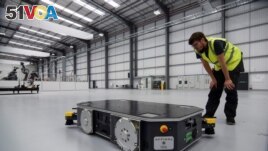Electric vehicle companies are racing to become the next Tesla, but want to avoid Elon Musk's early problems with production.
电动汽车公司竞相想成为下一个特斯拉,但是希望避免埃隆·马斯克早期的生产问题。
So, companies like Arrival and Fisker are taking very different roads to overcome such issues.
所以,像 Arrival 和 Fisker 这样的公司正在采取截然不同的途径来克服这些问题。
A few have found investors who are willing to spend billions to finance their startups. Rivian has raised around $10.5 billion from Amazon.com and Ford Motor Company. It is set to begin production on electric vans, trucks and SUVs.
一些人找到了愿意给他们的初创公司融资数十亿美元的投资者。Rivian从亚马逊公司和福特汽车公司筹集到约105亿美元。它将开始生产电动货车、卡车和SUV。
Startup companies without enough investment money need less costly ways to produce a lot of vehicles in a short time. If they cannot, they risk having the problems Tesla had in its early years.
没拿到足够投资的初创公司需要用成本更低的方式在短时间内量产汽车。如果他们做不到,就可能遇到特斯拉早期遇到的问题。
The remarkable thing is that Tesla was not ruined financially in reaching mass production, Musk told Reuters news agency.
马斯克告诉路透社,值得注意的是,特斯拉在实现大规模生产方面并没有财务破产。
The traditional method of many carmakers has been to spend above $2 billion on a big factory to build 240,000 or more vehicles each year.
许多汽车制造商的传统方法是在一家大型工厂上花费超过20亿美元,以便每年建造24万辆以上的汽车。
Arrival has chosen instead to build electric van and bus "microfactories." They are small factories that cost $50 million and have fewer pieces of expensive equipment. Arrival does not need special equipment to paint its vehicles because they are made of lightweight colored plastic. Painting equipment can cost hundreds of millions of dollars.
Arrival公司反其道而行之,选择建造电动货车和公共汽车的微型工厂。这些微型工厂耗资5000万美元,而且昂贵的设备较少。Arrival公司不需要特殊设备为车辆喷漆,因为它们是由轻质彩色塑料制成的。涂装设备可能会耗资数亿美元。
Arrival plans microfactories close to major markets around the world. This will let them hire local workers, and lessen shipping costs.
Arrival公司紧靠世界各地主要市场规划卫星工厂。这将使他们能够雇佣当地工人,并降低运输成本。
The money a company must raise "to do this the traditional way...keeps startups from coming forward with new ideas," said Mike Abelson. He is the North American head of Arrival.
麦克·阿贝尔森表示:“公司必须以传统方式募集资金,这限制了初创公司提出新理念。”他是Arrival公司的北美负责人。
The company raised about $660 million from selling shares of its company in its March public offering. Now, it is building two U.S. plants. One is in North Carolina and will make vans. The other is in South Carolina and will make buses. In addition, it is building a factory in Spain. Abelson said Arrival will announce more factories later this year.
该公司在3月份的公开募股中通过出售公司股票筹集到了大约6.6亿美元。现在,它正在建设两家美国工厂。一家位于北卡罗莱纳州,将生产货车。另一家位于南卡罗莱纳州,将生产公共汽车。此外,它正在西班牙建厂。阿贝尔森表示,Arrival公司今年晚些时候将会宣布更多工厂。
Production in microfactories
微型工厂的生产
Arrival's first microfactory in Bicester, England, will serve as the model for other plants. The lack of painting equipment is just one way the company will avoid the costs of traditional vehicle making.
Arrival公司在英格兰比斯特的首家微型工厂将成为其它工厂的模板。缺少涂装设备只是该公司避免传统造车成本的一种方式。
The startup's engineers have built molds for plastic vehicle parts costing thousands of dollars. That is far less than the millions of dollars needed for traditional metal equipment. Arrival's engineers have also designed their own molding machines.
这家初创公司的工程师已经为汽车零件制造了价值数千美元的模具。这远远低于传统金属设备所需的数百万美元。Arrival公司的工程师还设计了自己的成型机。
Abelson said Arrival needs around 70 robots for each microfactory. And it is buying only commonly used, basic robots from long-time car industry suppliers.
阿贝尔森表示,Arrival公司每家微型工厂需要大约70个机器人。而且它只从汽车行业的长期供应商那购买常用的基础款机器人。
Going small means that Arrival can produce 10,000 vans each year in each microfactory rather than 100,000, Abelson says. Also, each microfactory will create around 250 jobs. That is not close to the many thousands of jobs created by larger plants in the past.
阿贝尔森表示,小型化意味着Arrival公司每年可以在每家微型工厂生产出1万辆火车,而不是10万辆。此外,每家微型工厂将会创造大约250个就业岗位。这与大型工厂过去创造的数千个工作岗位相差甚远。
"That means if a plant doesn't work out, it's not a disaster for a local economy," Abelson said. "A major car plant closing is a big hole to fill."
阿贝尔森表示:“这意味着如果一家工厂无法运转,对当地的经济来说并不是一场灾难。一家大型汽车厂的关闭是一个需要填补的大洞。”
‘Work our way backwards'
反向推进
Electric vehicle maker Canoo has taken a similar path. But leader Tony Aquila said Canoo will build a larger microfactory to serve as a center for smaller future factories.
电动汽车制造商Canoo也采取了类似的做法。但是该公司领导人托尼·阿奎拉表示,Canoo公司将建造一个更大的微型工厂,作为未来小型工厂的中心。
Electric Last Mile Solutions plans to launch a small electric van in the United States later this year. At first, it will reassemble prefinished vehicles made in China at an old General Motors plant in Indiana. There, it will add new safety features to meet U.S. regulations.
Electric Last Mile Solutions公司计划今年晚些时候在美国推出一款小型电动货车。首先,它将在印第安纳州的一家通用汽车旧厂重新组装在中国制造的预制汽车。在那里,它将添加新的安全功能以满足美国法规。
Company head James Taylor said this will at first save hundreds of millions of dollars on equipment. As profits grow, it will add in more American parts over time. "We'll work our way backwards," Taylor said.
公司负责人詹姆斯·泰勒表示,这首先可以节省数亿美元的设备费用,随着利润的增长,它将随着时间推移增加更多美国零部件。泰勒表示:“我们将会反向推进我们的工作。”
Other startups are doing production overseas to cut costs.
其它初创公司将在海外生产以降低成本。
Israel-based REE is looking at agreements with American Axle and Mitsubishi to help build its electric platforms.
总部位于以色列的REE公司正在考虑跟美国车桥制造公司以及日本三菱公司达成协议,以帮助打造其电动平台。
Both REE and Fisker have also teamed up with Canadian car supplier Magna International to build their electric vehicles. Fisker has a similar agreement with Taiwan's Foxconn Technology.
REE公司和Fisker公司还都跟加拿大汽车供应商曼格纳国际合作制造他们的电动汽车。Fisker公司与中国台湾省的富士康科技公司也有类似协议。
I'm Alice Bryant.
我是爱丽丝·布莱恩特。(51VOA.COM原创翻译,请勿转载,违者必究!)











